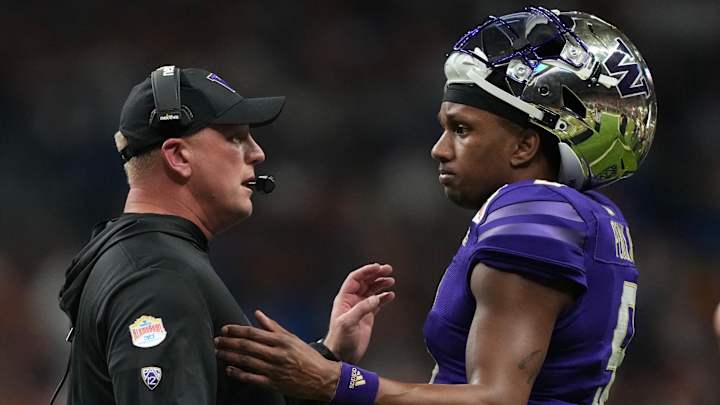How the Huskies Dealt With Their 2 Losses Last Season

In this story:
Jimmy Lake was as competitive as anyone, coach or player, who's come through the University of Washington football program over the past decade.
Yet his immediate response to losing five games before he was suspended and fired as head coach in 2021, beginning with a shocking upset to Montana, was nothing short of mind-boggling.
In particular, Lake presented a somewhat laissez faire attitude following what was perhaps the worst loss in Husky football history to the Big Sky visitor. He followed that up with something leaning to shrugs as his team dropped games to Michigan, Oregon State, UCLA and Oregon.
While he might have been trying to demonstrate cool under fire in those different public settings, Lake still seemed to send out a puzzling message.
Once he was removed as coach, the Huskies were left with eight defeats in 12 outings as a once-promising season totally imploded in disturbing fashion, and people wanted answers.
The immediate question raised, after loss after loss piled up and the explanations rang hollow, are these guys really invested in the program, beginning at the top?
On the initial game night of 2021, I asked Lake point-blank if he was shocked after losing to lower-level Montana. He said no. He should have been.
Sixteen months after the UW football leadership reset, and the team rallied impressively to post an 11-2 season, Kalen DeBoer recently readdressed the back-to-back midseason setbacks to UCLA and Arizona State by one score each.
His answers were detailed, committed and constructive. There were shortcomings and he addressed them.
"At that time, we were really going through it," DeBoer said. "There were some injuries that even built up from week one, week two, week three and week four, that [were] just kind of nicks, and guys were out, and just the way it overlapped, and the combinations we had to put on the field in particular at defensive back, really put us in a bind."
For example, DeBoer spoke about emergency cornerback starter Julius Irvin becoming injured but playing on at UCLA because there was no else to replace him, but he wasn't physically able to line up in certain formations. The coach mentioned how other players were on what amounted to pitch counts. Lineups were a patchwork job.
"The plan you worked on became even more complicated and somebody you're putting into a role and going down a path down you really don't want to," DeBoer said.
When the UCLA and Arizona State losses happened, 40-32 at the Rose Bowl and 45-38 in the desert, DeBoer, speaking in a concerned, measured tone, firmly promised in Tempe that his staff would restock the roster and personnel shortcomings wouldn't happen again.
Even more remarkable was Husky quarterback Michael Penix Jr.'s reaction to momentarily getting hurt and eventually losing to the Sun Devils — he got emotional and teared up in the postgame news conference, and vowed to get back to work when he got home.
DeBoer added that untimely turnovers plus rare offensive failures also contributed to those Husky losses, but they weren't for naught. He felt these experiences made his team stronger in the long run.
"In the end, we kept fighting and battling in those games in all areas, on both sides of the ball and on special teams," the coach said. "We learned a lot about ourselves — that we'll kept fighting, that we'll keep playing."
Go to si.com/college/washington to read the latest Inside the Huskies stories — as soon as they’re published.
Not all stories are posted on the fan sites.
Find Inside the Huskies on Facebook by searching: Inside Huskies/FanNation at SI.com or https://www.facebook.com/dan.raley.12
Follow Dan Raley of Inside the Huskies on Twitter: @DanRaley1 or @UWFanNation or @DanRaley3
Have a question, direct message me on Facebook or Twitter.

Dan Raley has worked for the Seattle Post-Intelligencer, Atlanta Journal-Constitution and Fairbanks Daily News-Miner, as well as for MSN.com and Boeing, the latter as a global aerospace writer. His sportswriting career spans four decades and he's covered University of Washington football and basketball during much of that time. In a working capacity, he's been to the Super Bowl, the NBA Finals, the MLB playoffs, the Masters, the U.S. Open, the PGA Championship and countless Final Fours and bowl games.